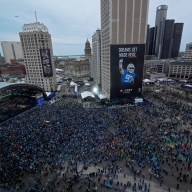Rubin
TV AS RECORD SHOP: The music industry – the monolithic business dominated nowadays by four corporations whose management competence seems to have gone the way of the vinyl LP – is in big trouble. The digital revolution caught it flat-footed, and every effort it’s made at damage control either plays out like its threatening and bullying its customers or, even if successful, only manages to make EMI, Sony, Vivendi Universal and Warner look like they’re a year or two behind the times, while their audience and technology sprints ahead with a lead of what looks like decades.
It’s the perfect time to do something drastic, which is exactly what Columbia Records, Sony’s flagship music label, did when it made Rick Rubin co-head of the company in May. Rubin is a Buddha-like producer who started Def Jam records in the ‘80s, made the Beastie Boys stars, revived the career of Johnny Cash, and is considered a visionary by much of the industry and, according to a profile of Rubin that ran in this weekend’s Sunday New York Times Magazine, he’s been given free rein to re-invent the company,.
Rubin doesn’t have a desk or office in any of the company’s corporate headquarters, though one of his first priorities seems to be moving Columbia’s offices on both coasts to new, more artist-friendly digs, and to escape premises that, in Rubin’s words are “tainted with the old way.”
One of the first things Rubin did was to start a project called Big Red that employed young interns to basically tell the industry – for not the first time – what it should already know, which is that, according to Mark DiDia, Rubin’s new head of operations “a) no one listens to the radio anymore, b) they mostly steal music, but they don’t consider it stealing, and c) they get most of their music from iTunes on their iPod.” I certainly hope that they didn’t spend too much gathering this earth-shattering information.
With the disappearance of big music retailers like Tower Records and radio diminished to marginal status, according to the Times, movies and TV have taken over the job of selling music – Disney’s High School Musical and American Idol are considered the place to launch careers or revive flagging ones, while a song’s appearance on a show like Grey’s Anatomy can create a hit. The audience has atomized from the tribes once courted by the industry, and the one thing that brings them together is TV, and the computers they can turn on to buy whatever they might have heard during a big love scene, a credit sequence, or a commercial.
One of Rubin’s first signings even came through TV – Paul Potts, the Welsh cell phone salesman and opera singer who became a sensation thanks to a YouTube clip from Britain’s Got Talent. Rubin, of course, is a romantic, and the long-term prescription for saving the music industry might mean absorbing it into its TV and movie counterparts – the sort of convergence that seems more possible and even desirable, at the moment, than some hardware marriage between our TV sets and computers. Which might still happen, in spite of whatever visionary changes Rubin might make to dinosaurs like Columbia, who look more and more each day like dinosaurs staring enraptured at the asteroid heading straight for them.
















